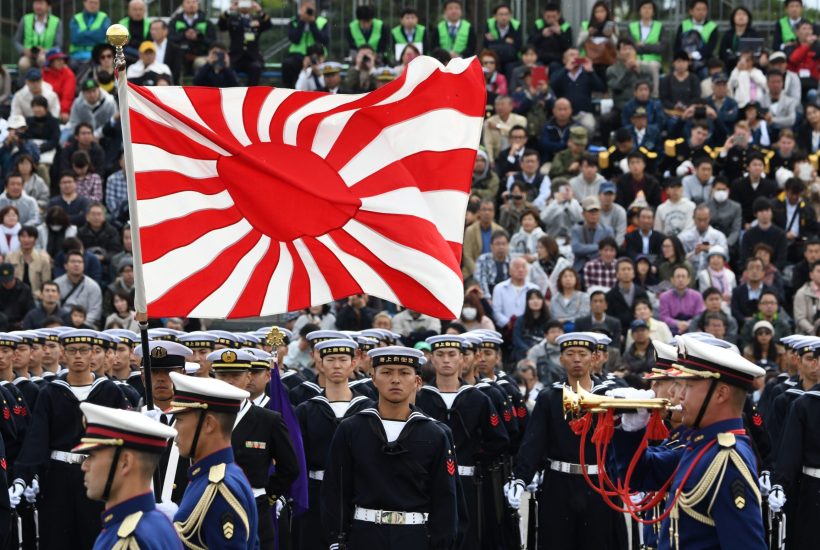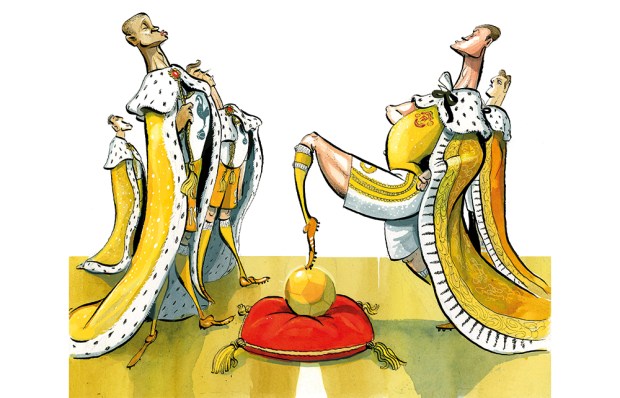Ant and Dec have done most things in their long careers in light entertainment. But the versatile duo broke new ground last week when they infringed on international diplomacy by wearing Japanese Rising Sun flags on their headbands in a skit with singer Anne-Marie. The use of allegedly offensive WW2 era imagery forced programme makers to edit the sequence for future broadcast. ITV and Anne-Marie were obliged to make hasty apologies.
But is the Rising Sun really offensive? And is anyone really offended?
The flag is of ancient origin, but it has been associated with the Japanese military since 1870, it is still the emblem of the Self Defense Force (as close as modern Japan gets to an army). It is far less common than the red dot on white background national flag (the ‘Hinomaru’) but is still favoured by the extreme right ‘uyoku dentei’ groups who dress in WW2 era uniforms and drive around in armoured ‘sound trucks’ blaring out martial music. Some do still see it as the military flag.
On the other hand, it is also used with entirely peaceful intent by fishermen as a ‘good catch flag’, by mothers to celebrate childbirth, and decoratively, in seasonal festivals, to give an olde worlde feel to costumes and stalls. The flag also features on company logos and signs such as that of the Rising Sun Tokyo’s oldest British pub, where assorted ex-pats have been drinking away their homesickness for 50 years, without being noticeably outraged by the attendant imagery.
The main offence takers against the flag are South Korea, which was occupied by the Japanese army from 1910 to 1945. Last year the South Korean National Assembly passed a resolution by 196 votes to 3 calling for the flag to be banned at the 2020 Tokyo Olympics. During the debate there were pictures displayed of the Rising Sun flag next to a Swastika with an equals sign placed between them. This incensed Japanese officials, who rejected the demand and defended the flag as a harmless traditional motif with numerous international parallels.
How the ordinary Japanese people feel about the flag is another matter. It’s easy to depict the Japanese, especially if you take the current rightist administration of Shinzo Abe as indicative of the people as a whole, as reactionary and uncompromising about anything related to WW2. A.A. Gill, in his notorious, ‘Mad in Japan’ essay depicted a society with a hard-wired sense of exceptionalism and victimhood, in perpetual belligerent denial about its own wartime activities.
But in twenty years’ in Tokyo, I’ve met hardly anyone that conforms to the Gill stereotype and don’t recognise his characterisation at all. Resentment, bitterness and rejection of generally accepted historical narratives certainly persist, but tend to be most common among the very old. Old taboos are disappearing with artists such as Haruki Murakami and Hideki Noda addressing the issues of wartime atrocities in their work. And young people are far more open and positive about the world beyond Japan’s borders and are especially enthusiastic about all things Korean since the start of the K-pop (Korean pop music) boom, and the recent popularity of Korean daytime dramas.
Some view the Korean flag outrage with great suspicion, seeing it as a useful tool in ongoing bitter diplomatic and trade disputes. It has been pointed out that the outrage is fairly new, only really beginning in 2011 and possibly engineered after a football incident when Ki Sung-yueng pulled a monkey face at Japanese supporters after scoring for South Korea in a game against Japan. He defended his actions by claiming he was making a general protest against racism in football and was provoked by the sight of a Rising Sun flag in the stadium.
The other factor that makes it highly unlikely that the Japanese authorities will take any measures to ban or remove Rising Sun flags at the upcoming Olympics is the reluctance to acquiesce to international pressure on what the Japanese see as cultural matters. This is less the result of a reactionary mindset or the denial of any embarrassing history, and more a product of a stubborn resistance to ‘gaiatsu’ (outside power) exercising influence on matters considered the preserve of the Japanese nation.
It’s a question of pride, rather than prejudice: the more strident the protest and the shriller the denunciation, the less likely the Japanese are to be persuaded. Howls of fury and comparisons with Swastikas aren’t likely to work. So, while it’s inevitable that we can expect to see a few Rising Sun’s here and there at the upcoming Olympics, the best strategy for those who truly find the flag offensive might be to make their views known in a moderate fashion and leave the rest to the good sense and decency of the Japanese people.
Got something to add? Join the discussion and comment below.
Get 10 issues for just $10
Subscribe to The Spectator Australia today for the next 10 magazine issues, plus full online access, for just $10.




















Comments
Don't miss out
Join the conversation with other Spectator Australia readers. Subscribe to leave a comment.
SUBSCRIBEAlready a subscriber? Log in